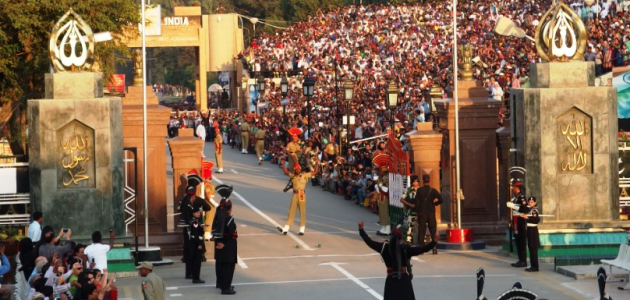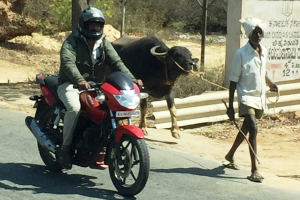After a memorable border crossing, the Course for Senior Officials continued to the second part of its study tour in the capital New Delhi and the economic powerhouse Bangalore.

The border crossing point in Wagah between Pakistan and India (shown at the back of the picture) closes with a military ceremony every evening. Photograph: Guilhem Vellut/Flickr/CC BY 2.0
With thousands of spectators shouting on cue, “Hindustan” on the one side and “Pakistan” on the other; deafening drums and border guards in full dress uniforms, the half-hour spectacle of the Wagah Border Ceremony consists of a finely choreographed series of intimidating poses by India and Pakistan, whose relationship has remained consistently fraught for over 60 years. It is held every evening when the only currently active land crossing on the Indian-Pakistani border closes to the cheers of an enthusiastic audience. No real violence is supposed to take place during this presentation. A few hundred kilometres further north in Kashmir, people on both sides are killed or wounded by artillery and rifle fire almost on a daily basis. In this context, the Wagah Border Ceremony gets right to the heart of the bizarre relationship between these two countries.
For the Federal Academy for Security Policy (BAKS), this border ritual also marked the transition from the study tour’s first stop in Pakistan to the second leg of the journey in India. The discussions that took place in New Delhi and Bangalore after the border crossing made one thing particularly clear: while Pakistan primarily thinks about security policy in terms of its big neighbour to the east, Pakistan has long since ceased to play a key role in India’s security policy. India sees itself as on the way to becoming a geopolitical major world power. A dynamic economy is supposed to drive this development, and economic growth at any cost has been the main objective of the government under Narendra Modi since 2014.
India Sees Itself as on the Way to Becoming a Major World Power

India is a confident economic power where many high-tech groups already have locations, and is hoping for more investments. Photograph: Mendel
These developments are supposed to free the population from poverty for good, create about one million new jobs each month, and attract foreign companies and investments to India. In this way, India plans to grow into one of the most important global players whose economic power ought to surpass Germany’s within just seven years. It wants to be home to the most important hubs in not only Asia, but the whole world. Digitalisation and automation technology are supposed to make their way into all areas of life and the economy. A country that thinks and plans this way no longer sees Pakistan, which is small and unstable in comparison, as its competitor, but rather looks to the other major power in Asia: China.
At the same time, there is more to India than just high-tech companies and an upper middle class that has long since become part of the globalised world. The course participants experienced some of the enormous challenges facing the country first-hand. The pollution, for example in the capital New Delhi, has become extreme, while corruption and bureaucracy strangle even some of the best social projects. Women’s rights are protected by law, but do not reflect the reality of daily life. Although the constitution officially outlawed the discriminatory caste system in 1949, this system still clearly permeates social life in India. The hygienic conditions can be catastrophic. There are not enough schools or teachers to educate the burgeoning younger generations, and Hindu nationalism is taking on an increasingly aggressive character. The growth rates may be impressive, but the extreme poverty and daily gridlock made an equally powerful impression on the visitors from Germany.
Impressive Developments and Enduring Problems

A country of contrasts: economic development and traditional agriculture often exist side by side in India. Photograph: BAKS/Wagner
It remains to be seen whether India can solve these problems, or whether they could put the brakes on its booming economy. Those who attended the Course were often left with the confusing impression of a giant that had developed impressively since the beginning of the economic liberalisation in the early 1990s and now exhibits great confidence under Modi’s government, but is far from removing the many old and new obstacles on its path to becoming a global player.
One such obstacle is its relationship to Pakistan. India sees itself at a higher, global level, and looks down on Pakistan, a country burdened with economic and security problems, rather than using its position to improve the tense relationship between the two neighbouring countries. Neither India’s politicians, nor its society, are willing to consider a policy of outreach, let alone a serious effort to finally find a political solution to the Kashmir conflict. On the contrary, India believes it is legitimately entitled to all of Kashmir. As catastrophic as war would be for the region, the two nuclear powers remain entrenched in their positions.
Authors: Ulf Brüggemann and Claus Wagner
